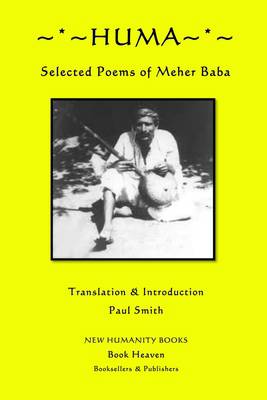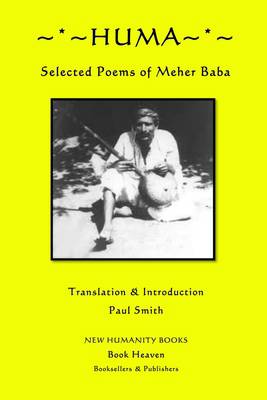
- Afhalen na 1 uur in een winkel met voorraad
- Gratis thuislevering in België vanaf € 30
- Ruim aanbod met 7 miljoen producten
- Afhalen na 1 uur in een winkel met voorraad
- Gratis thuislevering in België vanaf € 30
- Ruim aanbod met 7 miljoen producten
Zoeken
Omschrijving
HUMA: SELECTED POEMS OF MEHER BABA Translation & Introduction Paul Smith Merwan S. Irani (1894-1969), known world-wide as Meher Baba, took Huma (Phoenix) as his takhallus or pen-name when he composed enlightened ghazals in a mixture of Persian, Urdu, Hindi & Gujarati in his twenties as a realized disciple of the Qutub or Perfect Master Upasni Maharaj, and also later on. He knew the ghazals of Hafiz by heart as did his father the dervish Sheriar Irani, who had originally walked to Pune in India from Khooramshah in Iran. Merwan went on to reveal himself as Qutub and later also declared himself as the Rasool or Messiah (Avatar). The correct rhyme-structure has been kept as well as the beauty and meaning of these important beautiful, inspiring, mystical poems. CONTENTS: The Life of Meher Baba, The Ghazal and other forms he used, Selected bliography, Ghazals, Qasidas, Qit'as (Fragments), Slokas (Couplets). Appendix: The Eternal Triangle - The Dance of Love... A Dance-Film Production of Love's Divine Story Spanning All Time by Paul Smith from a Senario by Meher Baba. Pages 251. COMMENTS ON PAUL SMITH'S TRANSLATION OF HAFIZ'S 'DIVAN'."It is not a joke... the English version of ALL the ghazals of Hafiz is a great feat and of paramount importance. I am astonished. If he comes to Iran I will kiss the fingertips that wrote such a masterpiece." Dr. Mir Mohammad Taghavi (Dr. of Literature) Tehran."Superb translations. 99% Hafiz 1% Paul Smith." Ali Akbar Shapurzman, translator of works into Persian and knower of Hafiz's Divan off by heart. "Smith has probably put together the greatest collection of literary facts and history concerning Hafiz." Daniel Ladinsky (Penguin Books author). Paul Smith is a poet, author and translator of many books of Sufi poets of the Persian, Arabic, Urdu, Turkish, Pashtu and other languages including Hafiz, Sadi, Nizami, Rumi, 'Attar, Sana'i, Jahan Khatun, Obeyd Zakani, Mu'in, Amir Khusrau, Nesimi, Kabir, Anvari, Ansari, Jami, Omar Khayyam, Rudaki, Yunus Emre, Bulleh Shah, Shah Latif, Khushal Khan Khattak, Ghalib and many others, and his own poetry, fiction, childrens books, plays, biographies and a dozen screenplays. New Humanity Books amazon.com/author/smithpa
Specificaties
Betrokkenen
- Auteur(s):
- Vertaler(s):
- Uitgeverij:
Inhoud
- Aantal bladzijden:
- 260
- Taal:
- Engels
Eigenschappen
- Productcode (EAN):
- 9781480221130
- Verschijningsdatum:
- 3/12/2012
- Uitvoering:
- Paperback
- Formaat:
- Trade paperback (VS)
- Afmetingen:
- 152 mm x 229 mm
- Gewicht:
- 385 g

Alleen bij Standaard Boekhandel
+ 72 punten op je klantenkaart van Standaard Boekhandel
Beoordelingen
We publiceren alleen reviews die voldoen aan de voorwaarden voor reviews. Bekijk onze voorwaarden voor reviews.











